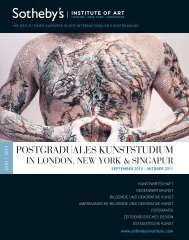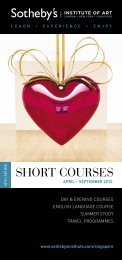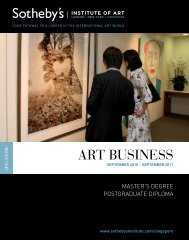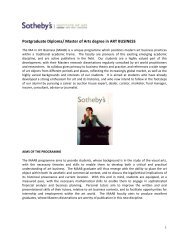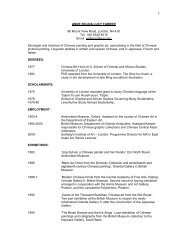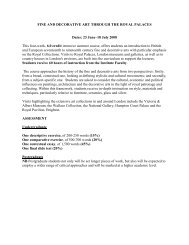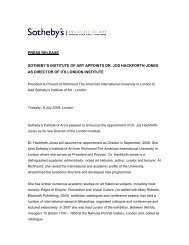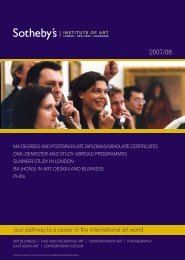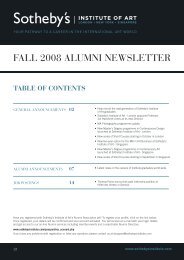Zones of Indistinction: Giorgio Agamben's Bare Life and
Zones of Indistinction: Giorgio Agamben's Bare Life and
Zones of Indistinction: Giorgio Agamben's Bare Life and
You also want an ePaper? Increase the reach of your titles
YUMPU automatically turns print PDFs into web optimized ePapers that Google loves.
CTTE_A_384228.fm Page 124 Sunday, April 26, 2009 1:30 PM<br />
124<br />
Marcelo Brodsky, Buena Memoria, The Classmates, 1996, altered gigantograph, 69 in × 46 in, courtesy <strong>of</strong> the artist <strong>and</strong><br />
La Marca Editora<br />
Britain.’ Steve McQueen<br />
quoted in Vanessa Thorpe<br />
<strong>and</strong> Henry McDonald,<br />
‘Anger as new film <strong>of</strong> IRA<br />
hero Bobby S<strong>and</strong>s screens<br />
at Cannes’, Observer, 11<br />
May 2008, p 12.<br />
27 It has been widely reported<br />
that up to 128 detainees in<br />
Guantánamo Bay went on<br />
hunger strike in 2005. Of<br />
the eighteen people<br />
hospitalised, at least<br />
thirteen were force-fed<br />
through nasal tubes <strong>and</strong><br />
five were given intravenous<br />
hydration. See Carol D<br />
Leonnig, ‘More Join<br />
Guantánamo Hunger<br />
Strike’, Washington Post,<br />
13 September 2005.<br />
Agamben’s thesis whilst<br />
studying at the University<br />
<strong>of</strong> Rome was written on<br />
Simone Weil who is widely<br />
considered to have starved<br />
herself to death in<br />
sympathy with the citizens<br />
<strong>of</strong> Occupied France. The<br />
coroner’s report into her<br />
the protection <strong>of</strong> political representation. It is to deny, in sum, the very<br />
community that each <strong>of</strong> us takes for granted <strong>and</strong> yet that each <strong>of</strong> us could<br />
one day find ourselves without. Taking his cue from Arendt, Agamben<br />
has argued that, in the context <strong>of</strong> the nation-state:<br />
… the so-called sacred <strong>and</strong> inalienable rights <strong>of</strong> man show themselves to<br />
lack every protection <strong>and</strong> reality at the moment in which they can no longer<br />
take the form <strong>of</strong> the rights belonging to the citizens <strong>of</strong> the state. (HS 126)<br />
This can be summed up even more succinctly: human rights are the<br />
rights <strong>of</strong> the citizen, not homo sacer – the latter being our modern-day<br />
refugee, the political prisoner, the disappeared, the so-called ‘ghost<br />
detainee’ <strong>and</strong> unlawful combatant, the victim <strong>of</strong> torture <strong>and</strong> the dispossessed.<br />
And, in a ‘state <strong>of</strong> exception’, sovereign power, which has effectively<br />
usurped legislative (legal) power, will decide upon the distinction<br />
(or, more likely, non-distinction) between the two; decide, that is to<br />
observe, between the fact <strong>of</strong> life or death.<br />
Marcelo Brodsky, Buena Memoria, The Classmates, 1996, altered gigantograph, 69 in × 46 in, courtesy <strong>of</strong> the artist <strong>and</strong> La Marca Editora<br />
CONCLUSION<br />
If Rancière, writing in The Politics <strong>of</strong> Aesthetics (2004), gives art the<br />
same capacity for re-imagining (or envisioning) the possible (or the



